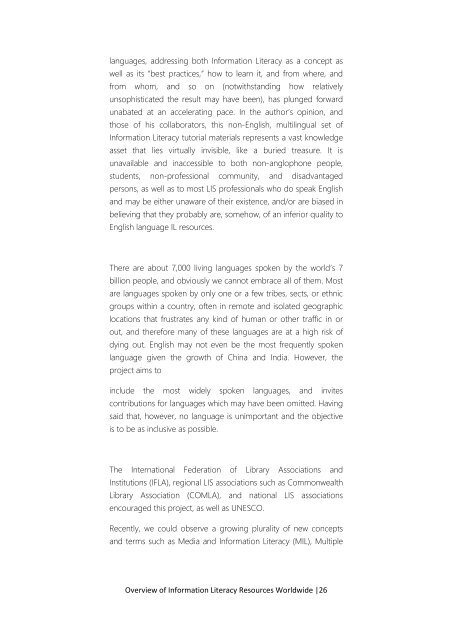2_UNESCO_Composite_Document
2_UNESCO_Composite_Document
2_UNESCO_Composite_Document
You also want an ePaper? Increase the reach of your titles
YUMPU automatically turns print PDFs into web optimized ePapers that Google loves.
languages, addressing both Information Literacy as a concept as<br />
well as its “best practices,” how to learn it, and from where, and<br />
from whom, and so on (notwithstanding how relatively<br />
unsophisticated the result may have been), has plunged forward<br />
unabated at an accelerating pace. In the author’s opinion, and<br />
those of his collaborators, this non-English, multilingual set of<br />
Information Literacy tutorial materials represents a vast knowledge<br />
asset that lies virtually invisible, like a buried treasure. It is<br />
unavailable and inaccessible to both non-anglophone people,<br />
students, non-professional community, and disadvantaged<br />
persons, as well as to most LIS professionals who do speak English<br />
and may be either unaware of their existence, and/or are biased in<br />
believing that they probably are, somehow, of an inferior quality to<br />
English language IL resources.<br />
There are about 7,000 living languages spoken by the world’s 7<br />
billion people, and obviously we cannot embrace all of them. Most<br />
are languages spoken by only one or a few tribes, sects, or ethnic<br />
groups within a country, often in remote and isolated geographic<br />
locations that frustrates any kind of human or other traffic in or<br />
out, and therefore many of these languages are at a high risk of<br />
dying out. English may not even be the most frequently spoken<br />
language given the growth of China and India. However, the<br />
project aims to<br />
include the most widely spoken languages, and invites<br />
contributions for languages which may have been omitted. Having<br />
said that, however, no language is unimportant and the objective<br />
is to be as inclusive as possible.<br />
The International Federation of Library Associations and<br />
Institutions (IFLA), regional LIS associations such as Commonwealth<br />
Library Association (COMLA), and national LIS associations<br />
encouraged this project, as well as <strong>UNESCO</strong>.<br />
Recently, we could observe a growing plurality of new concepts<br />
and terms such as Media and Information Literacy (MIL), Multiple<br />
Overview of Information Literacy Resources Worldwide |26


